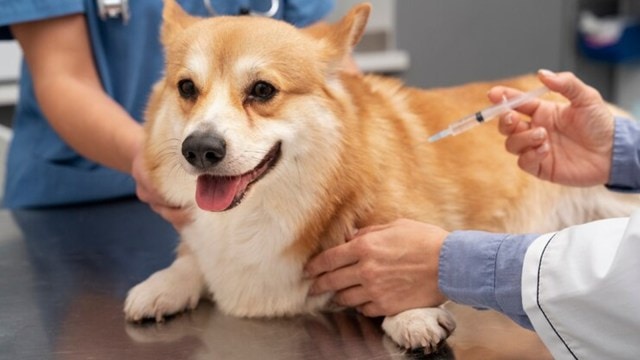📣 For more lifestyle news, click here to join our WhatsApp Channel and also follow us on Instagram
Don’t forget to get your dog vaccinated against these diseases
Understanding the specifics of pet vaccination schedules and their importance is crucial for every pet owner.
 Learn the importance of pet vaccinations for dogs. Discover core and non-core vaccines, scheduling tips, and how to handle pets with special needs. (Source: Freepik)
Learn the importance of pet vaccinations for dogs. Discover core and non-core vaccines, scheduling tips, and how to handle pets with special needs. (Source: Freepik)Vaccination is a cornerstone of responsible pet care, protecting pets from a variety of diseases and ensuring their overall well-being. Across India, veterinary clinics and pet hospitals provide a range of essential immunisations for dogs, cats, and even birds. However, understanding the specifics of pet vaccination schedules and their importance is crucial for every pet owner.
Core vaccines for dogs
Core vaccines, essential for all dogs, include the rabies vaccine and the combination vaccine for distemper, hepatitis, parvovirus, leptospirosis, and parainfluenza—commonly referred to as DHPP or DHP. These protect dogs from highly contagious and potentially fatal diseases, said Dr Shambhavi Avinash Sabnis, Tailsmen Veterinary Specialty, Pune, Maharashtra.
For dogs with active outdoor lifestyles or frequent exposure to tick-prone areas, non-core vaccines may be recommended. These include vaccines for canine coronavirus, kennel cough, and Lyme disease, according to Dr Sabnis. Consulting with a veterinarian can help determine the right immunization plan based on your pet’s environment and activities.
 By staying informed and proactive about vaccinations, pet owners can safeguard their furry companions’ health, ensuring a long and happy life. (file)
By staying informed and proactive about vaccinations, pet owners can safeguard their furry companions’ health, ensuring a long and happy life. (file)
Maintaining a vaccination schedule
Adhering to a recommended vaccination schedule is vital, as most vaccines require regular boosters to maintain immunity. Dr Sabnis advised discussing any past health concerns or allergic reactions with your veterinarian before vaccinating your pet. Post-vaccination, monitor your pets for mild side effects such as swelling or lethargy. For severe reactions, seek immediate veterinary attention.
Not all pets respond equally to vaccines, said Dr Sabnis. Animals with weakened immune systems or those with a history of severe allergic reactions may experience challenges. In such cases, antibody titer tests—which measure existing immunity levels—can help minimise unnecessary vaccinations.
By staying informed and proactive about vaccinations, pet owners can safeguard their furry companions’ health, ensuring a long and happy life.
📣 For more lifestyle news, click here to join our WhatsApp Channel and also follow us on Instagram




- 01
- 02
- 03
- 04
- 05























